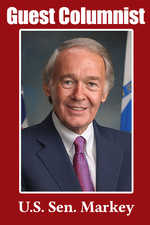
Guest Column: The Time is Now to Protect Our Local Hospital Workers
It is now clear that we are at war with the coronavirus. While the people of our state need a range of help and assistance, one action we need to take is clear to me: we need a massive wartime manufacturing mobilization for coronavirus testing kits and personal protective equipment for medical personnel. The courageous men and women who are on the frontlines at area hospitals need to have all the tools, equipment, and devices they need to test and treat patients.
That is why I have called on the Trump administration to immediately use existing authorities under the Defense Production Act to increase private production of the personal protective equipment, medical supplies and devices, and diagnostic testing supplies we need to combat the coronavirus. We need to activate our capable and talented domestic medical device and supply industry and bring the full power of the federal government to bear in responding to this crisis.
I have been working closely with the Massachusetts Health and Hospital Association, the Massachusetts Nurses Association, and 1199SEIU United Healthcare Workers East. They have all raised alarms that there is insufficient medical equipment and supplies to test and treat affected individuals and protect health care workers and first responders.
The U.S. Department of Health and Human Services estimates that the United States could need up to 3.5 billion respirator masks to confront the brunt of this virus. But right now, the Strategic National Stockpile — the country's emergency medical supply "bank" – holds only a small fraction of that, just 12 million respirator masks. We do not want our doctors, nurses, and medical workers reusing masks and gloves.
Our nurses and healthcare workers are on the frontlines fighting this virus every day. We need to ensure that they have the proper equipment to keep themselves and their patients safe — gowns, gloves, face shields, surgical masks, N95 respirators, ventilators, disinfectant wipes, and hand sanitizers. This equipment is lifesaving, and it would be irresponsible to not take every possible measure to provide these devices.
Additionally, hospitals and labs in Massachusetts and across the nation are attempting to ramp up testing capacity, but continue to face shortages in test kits and supplies. Last Friday, the Waltham-based Thermo Fisher company won federal approval to provide high—speed tests to hospitals and labs, a big step in the right direction to address this testing crisis and expand access to these kits.
But we are still not testing for coronavirus at the pace that is necessary to fully understand the scope of this virus. We need to increase our production of swabs and other testing materials, in addition to calling on the CDC to publish its testing plans, including a projection of the number of tests that will be available in the coming weeks.
I also plan to ask the National Institutes of Health to immediately provide additional flexibility to research grantees to repurpose equipment and resources toward coronavirus diagnostic testing. With such flexibility, researchers can come together to funnel equipment to hospitals, share expertise, and set up testing in labs that have the proper safety procedures.
As a nation, we need to focus on what health officials call "flattening the curve," or increasing our social distancing and testing capability to slow the spread of the virus. By doing so, we can prevent a spike in infected people all at once, ensuring that our health care system in the United States is able to properly deal with this pandemic.
Our nurses, health-care workers, and researchers are the foot soldiers in this fight. We owe them an enormous debt of gratitude, and must provide them with the resources they need to do their jobs safely and securely. They don't have a road map for what is happening right now. It is unprecedented. They have skills, they have a commitment, and they have the hearts of heroes. We owe them the resources that they need in order to protect them so they can do their jobs.
That is why I am calling for the immediate use of the Defense Production Act; Massachusetts people deserve nothing less at this time.
Tags: guest column,
More Coronavirus Updates
Keep up to date on the latest COVID-19 news:



